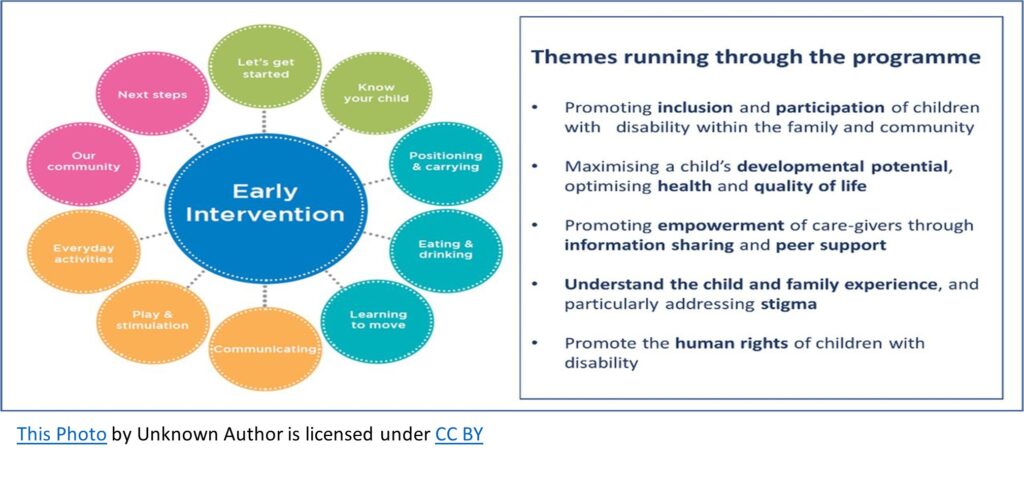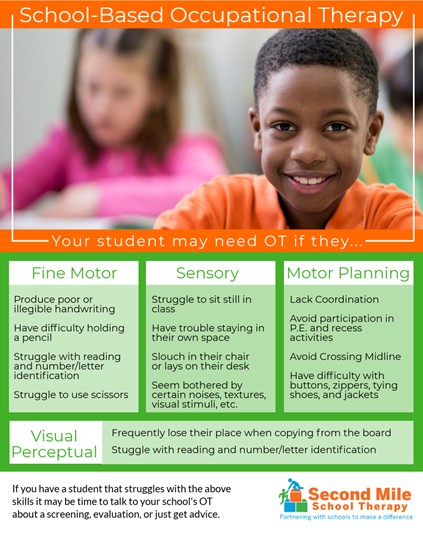What is Occupational Therapy?
Occupational Therapy or OT helps people of all ages, with all kinds of disabilities and disorders to help improve their ability to participate in everyday activities that they find meaningful. The areas of focus in OT include activities of daily living (which include bathing, dressing, eating, toileting, etc.), instrumental activities of daily living (which include driving, shopping, meal prep, house maintenance, etc.), health management, rest and sleep, education, work, play, leisure, and social participation. There are a variety of settings an occupational therapist works in such as hospitals, outpatient clinics, home health, schools, and early intervention programs (EI) to name a few. United Cerebral Palsy of Central PA has a variety of services they offer for all ages, one of the services being early intervention.
Early Intervention
Early intervention works with children 0-3. A few, of the areas that OT typically focuses on includes play, feeding, sensory processing, and motor development (fine and gross motor skills). Occupational therapists in early intervention are there to assist the families and help coach them on strategies that can help the child develop the skills they need to gain independence to do the activities or routines that the parents find important for their child to do as the grow up. Early intervention OT is a way to help develop the skills the child will need later in life by finding the strategies that the parents can work on with the child to help develop the skills at a young age. Occupational therapists can work with children that have difficulty with sensory processing by finding strategies to help them reorganize their sensory system to be able participate in activities and routines. Occupational therapists in early intervention are there to help coach the parent or caregiver on sensory strategies that they can use with their child. Once a child ages out of the Early Intervention program a family can seek occupational therapy services or other services elsewhere if they still have concerns that their child still needs help in certain areas as they start going to school and later in life.

School-Based
Occupational therapy in a school works with children ages 3 to 21 and is a way to help support students engagement in school activities, such as their academics, social interaction with peers, and play to name a few. OT’s can work with students to help them develop or improve their fine motor (this includes holding a pencil/crayon/marker, playing with toys) and gross motor (this includes walking, running, jumping, sitting, throwing) skills, their ability to process sensory information, and their social skills to be able to play/share/take turns with their peers.

https://secondmiletherapy.com/2018/12/11/student-needs-occupational-therapy
Hospital/Outpatient/Inpatient
When an individual is age 21 and older, they can receive occupational therapy services in hospitals, outpatient clinics, and inpatient clinics. In these settings occupational therapists work with individuals who’ve had a work-related injury, stoke, and post-surgery. OT’s work with the individual to overcome the barriers that are impacting their ability to participate in the activities they need and want to do, such as bathing, dressing, self-feeding, strengthening their body to independently complete everyday routines, and independent living. OT’s work with the individual on accomplishing their goal(s) to be able to go through their daily routines independently or with modified independence if they are in need of assistive technology. If needed, the OT’s help coach individuals on how to use the adaptive equipment to regain their independence.

– Kelly Mattern, OTS
References
McCool, D. (2018). How to tell if your student needs occupational therapy. Second Mile Therapy. https://secondmiletherapy.com/2018/12/11/student-needs-occupational-therapy/
Nampijja, Margaret & Webb, Emily & Nanyunja, Carol & Sadoo, Samantha & Nalugya, Ruth & Nyonyintono, James & Muhumuza, Anita & Ssekidde, Moses & Katumba, Kenneth & Magnusson, Brooke & Kabugo, Daniel & Cowan, Frances & Martinez-Biarge, Miriam & Zuurmond, Maria & Morgan, Cathy & Lester, Deborah & Seeley, Janet & Tann, Cally. (2019). Randomised controlled pilot feasibility trial of an early intervention programme for young infants with neurodevelopmental impairment in Uganda: a study protocol. BMJ open. 9. e032705. 10.1136/bmjopen-2019-032705.
Newsberry Health. (n.d.). Occupational therapy – newberry health. Occupational Therapy – Newberry Health. https://www.newberryhealth.org/services-and-treatments/our-services/therapy-services/occupational-therapy

